December, the last month of the year, is very special as it hosted many festivals and holidays. In December, almost every religion and country celebrate a number of joyful events. People are curious about the December Global Holidays, Below is a complete list of December global holidays, as well as religious holidays in December. There are a lot of holidays from the 1st of December to the 31st of December.
People look forward to holidays so they can spend time with their family and friends, and do you know how many December Global Holidays there are? Continue reading this article until the end to learn more about December Global Holidays and Festivities! Best wishes for the holidays!
Navigation
Most Popular December Global Holidays And Festivals
| December Global Holidays/Festivals | Celebration Date |
| Santa Lucia | December 13 |
| Yule | December 21 – January 1 |
| Festivus | December 23 |
| Christmas | December 25 |
| Kwanzaa | December 26 – January 1 |
| Boxing Day | December 26 |
| Hanukkah | November 28 – December 6 |
| New Year’s Eve | December 31 |
Christmas
Celebration Date: December 25
Category: Religious
Celebration Purpose: To commemorate the birth of Jesus Christ
Region of celebration: Worldwide
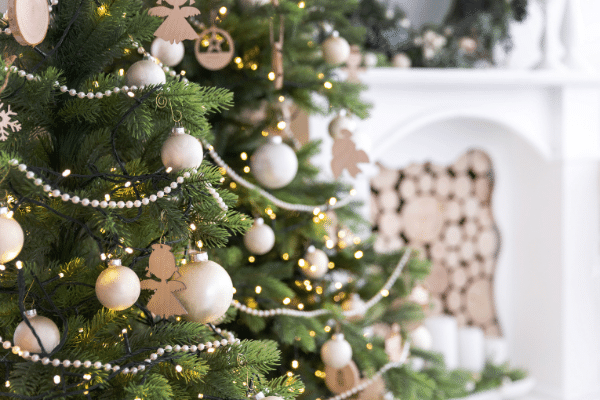
Christmas Day honors Jesus’ birth, which occurred on December 25, 1 BC (according to legend, but unlikely in actuality). In most nations, the 25th of December will be a national holiday. If the 25th of December falls on a weekend, a neighboring weekday may be used as a holiday.
Christmas is the historical celebration of the birth of Jesus Christ in the Christian faith. Christmas customs differ across the world, depending on whether they are observed for religious reasons or just as a cultural event.
Christmas is a very popular and very important December holiday. The day celebrates the birth of Jesus Christ of Nazareth, whom Christians regard as God’s final genuine prophet sent to redeem humanity from sin. The special thing about Christmas is that it is widely observed even by non-Christians.
Christmas in the United States is marked by Christmas trees, visits from Santa Claus, and visions of snowy landscapes, whereas Christmas in Australia occurs during the summer, and it is common to go camping or to the beach for the holiday. A “Christmas Bush,” a natural Australian tree with tiny green leaves and scarlet blossoms in the summer, is decorated by some Australians.
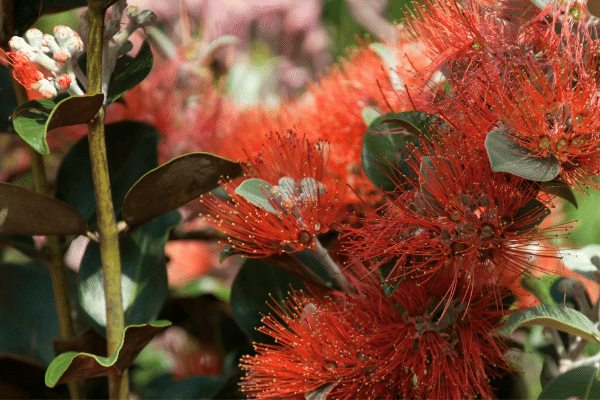
Christmas Traditions
Mistletoe
Kissing someone who happens to be standing beneath a sprig of mistletoe is considered a Victorian England custom. However, the fact that Mistletoe grows its fruit around the Winter Solstice, and its alleged mystical capacity to cure and boost fertility, lends credence to this relatively new ritual.
Carol Singing
The ‘Modern’ tradition Carol singing, also known as Wassailing, became popular in England as a way for peasants to get much-needed alms from their feudal lords. This singing for money evolved from a tradition in which itinerant musicians would visit rich families and sing in exchange for money, food, or presents. And this tradition is still very popular during the Christmas holidays.
Christmas customs in England are similar to those in the United States, with the exception that instead of milk and cookies, children leave mince pies and brandy for Father Christmas. With its Christmas market, Iceland’s capital city Reykjavik transforms into a winter wonderland, where youngsters may meet not one, but thirteen Santas, known as Yule Lads. Every night until thirteen days leading up to Christmas, one Yule Lads appears delivering tiny gifts in shoes that are placed on window sills.
Know more about Christmas around the world here
Hanukkah
Celebration Date: November 28 – December 6
Category: Religious
Celebration Purpose: Celebration of the rededication of Second Temple in Jerusalem
Region of celebration: All around the world by Jewish People
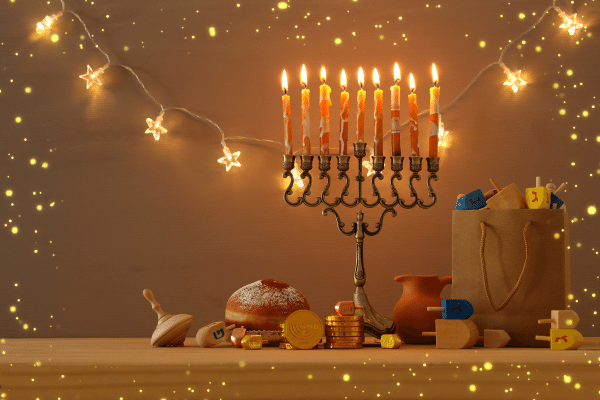
Hanukkah, also known as Chanukah, is an eight-day Jewish festival celebrating the rededication of Jerusalem’s Second Temple after the Maccabean Revolt. Those who were there for the rededication saw what they thought was a miracle. The flames continued to burn for eight nights despite the fact that there was only enough unadulterated oil to keep the menorah’s candles glowing for a single day.
Hanukkah, also known as the Festival of Lights, begins on the Hebrew calendar’s 25th of Kislev. The menorah is the focal point of Jewish celebrations. After sundown on each of the holiday’s eight nights, another candle is added to the menorah. The shamash (“helper”), the ninth candle, is used to ignite the others. Blessings are usually said, and Hanukkah dishes such as potato pancakes (latkes) and jam-filled doughnuts (sufganiyot) are fried in oil. Playing dreidels and giving gifts are two more Hanukkah traditions.
Hanukkah Traditions
Menorah
The lighting of the menorah each evening is the most essential of all Hanukkah customs. The menorah, also known as the Hanukkah lamp, is an eight-branched candelabra with a holder for the shammash (“servant”) candle that is used to light the other eight candles. It is a simple or elaborate candelabra with eight branches plus a holder for the shammash (“servant”) candle that is used to light the other eight candles. On the first evening, one candle is lit, followed by an extra candle on each successive evening until eight candles are blazing on the last evening.
Candles, which are introduced into the menorah progressively each night of the celebration from right to left but lighted from left to right, have replaced olive oil as the traditional method of lighting the menorah. Every night, a blessing is spoken when the candles are lit. The menorah was initially lit outside the dwelling, but it was brought inside to avoid disturbing neighbors in ancient times.
Liturgy and prayers
Daily reading of Scripture, recitation of select Psalms, almsgiving, and singing of a particular hymn are all part of the Hanukkah celebration. Hallel, public Torah readings, and the al ha-nissim (“for the wonders”) prayer are also part of the ritual. In certain synagogues and houses, the Scroll of Antiochus, an early medieval narrative of Hanukkah, is read. Thanks are given to God for delivering the strong into the hands of the weak and the bad into the hands of the good, in addition to daily prayers.
Hanukkah also means “education” in Hebrew, and rabbis and Jewish educators aim to instill in their congregations and pupils the idea that the festival honors Jewish strength, resilience, and continuity.
Kwanzaa
Celebration Date: December 26 – January 1
Category: Cultural
Celebration Purpose: Celebration of community, family and Preserve African values
Region of celebration: Worldwide (mostly US) by descendants from an African root
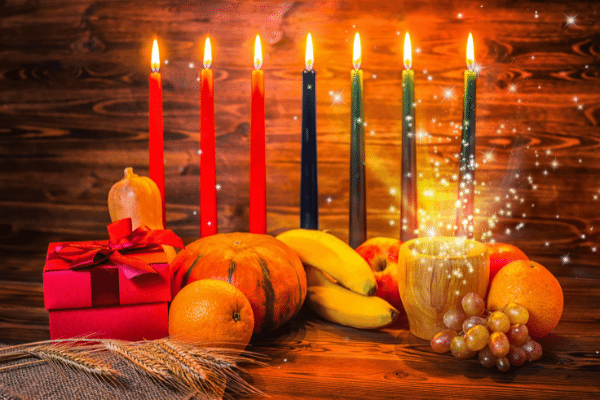
Kwanzaa is a festival that falls in December with African roots that is observed mostly in the United States. Dr. Maulana Karenga originated the day, which was initially commemorated in 1966 in the aftermath of the Watts riots in Los Angeles, California. The word ‘kwanzaa’ comes from the Swahili word ‘kwanza,’ which means ‘first.’ The word “matunda ya kwanza” is derived from the Swahili phrase “matunda ya kwanza,” which means “first fruits.”
Kwanzaa is generally celebrated with the performance of traditional African singing and dances. There are also other gatherings for storytelling, poetry reading, and a discussion of African culture’s core principles. These celebrations normally finish with a massive traditional supper at the conclusion of each day, followed by a gigantic feast known as ‘Karamu’ on December 31.
Kwanzaa’s colors are a reflection of the Pan-African movement, which stands for “unity” for people of African descent all over the world: black for the people, red for the noble blood that binds all people of African heritage together, and green for Africa’s fertile land.
Boxing Day
Celebration Date: December 26
Category: General
Celebration Purpose: Various symbolism
Region of celebration: Worldwide

Boxing Day is celebrated on December 26. The festival, which is only observed in a few nations, began in the United Kingdom during the Middle Ages. It was the day when alms boxes, which are collecting boxes for the destitute commonly stored in churches, were opened and their contents are given, a custom that continues in some communities. It was also the day when servants were typically granted the day off to spend with their family during the Christmas season.
Boxing Day has now become one of the most iconic December holidays and is a public holiday in a number of nations, including the United Kingdom, Canada, Australia, and New Zealand. On Boxing Day in England, soccer matches and horse races are common. The Irish call the occasion St. Stephen’s Day and they have a practice known as “hunting the wren,” in which youths tie a phony wren to a pole and parade it through town. Junkanoo, a street parade and festival in the Bahamas, commemorates Boxing Day.
From a charitable day to an extended Christmas afternoon, Boxing Day has changed. It’s a holiday in which the presents have already been unwrapped and the meal has already been enjoyed. It’s a holiday that’s best spent sitting around in brightly colored sweaters, pondering what to do next, lazily and lethargic. Also, many sporting events are organized on this very day like horse races, soccer, baseball, etc.
New Year’s Eve
Celebration Date: December 31
Category: General
Celebration Purpose: Celebration of the end of the year
Region of celebration: Worldwide
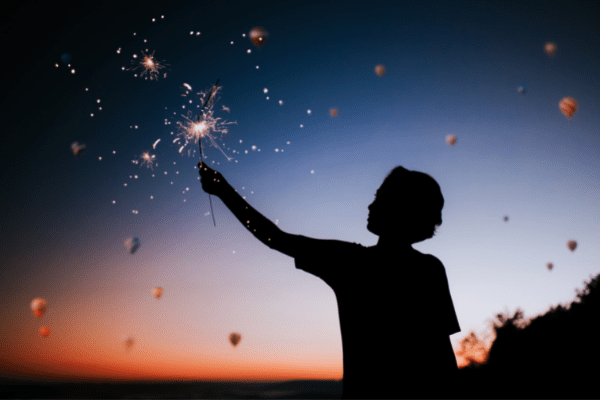
The final December holiday happens on the final day of December called New Year’s Eve. The objective of New Year’s Eve is to commemorate the end of the previous year and the beginning of the new one.
This day can be observed in a variety of ways. Many religious individuals go to the church to thank God for another year’s blessings. In bars, restaurants, and other social events people celebrate New Year’s Eve. The revelry generally reaches its pinnacle at midnight, when joyous screams, songs, and fireworks fill the air.
This day is especially for you to celebrate your time with your dearest family and family whom you may not spend time with due to various regions and share your happiness and hardships. Many people visit special places with friends and family and have a feast to enjoy their time together.
The final night of the year is also celebrated to forget the hardships and troubles you have throughout the year and hope for the best time in the coming year, usually celebrated with fireworks, song, dance, delicious foods and lots of booze.
Santa Lucia
Celebration Date: December 13
Category: Religious
Celebration Purpose: Celebrated as tribute to Lucia of Syracuse
Region of celebration: Scandinavia and Italy
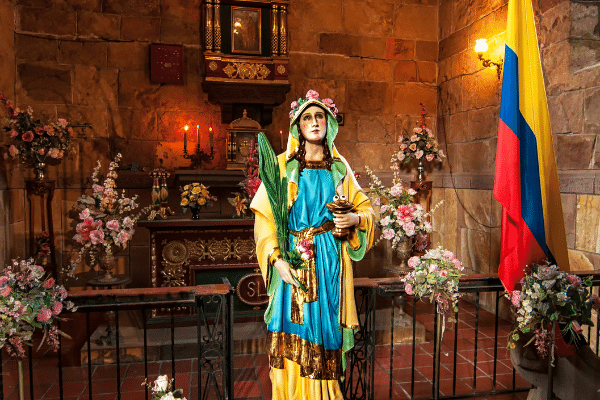
Every year on December 13, people all around Italy commemorate Santa Lucia, the patron saint of the blind, and her city of Siracusa, Sicilia.
Around 300 C.E., Santa Lucia, or Saint Lucy, was tormented for her religion, making her one of the early Christian martyrs. The pious young woman, according to mythology, refused to marry a strong pagan man who had fallen in love with her famed eyes. He dispatched his warriors to blind her when she rejected him, but strangely, her sight was restored. As a result, Santa Lucia is known over the world as the patron saint of the blind.
Lucia is a Latin word that means “light.” Santa Lucia’s feast day, which falls on the winter solstice, the shortest and darkest day of the year, is generally associated with light, giving revelers a cause to get together, light candles and torches, and enjoy an abundance of food and drink in the days gone by.
On this significant day, evocative concerts and processions are held, with vocalists dressed in white and wearing headdresses with genuine burning candles and families all around Italy assembling for a lovely supper of caserecce (meaning “cooked pasta”), roasted meats, and light desserts.
Yule
Celebration Date: December 21 – January 1
Category: Pagan
Celebration Purpose: Celebration to the Norse God, Odin
Region of celebration: Germanic peoples of Germany and Scandinavia
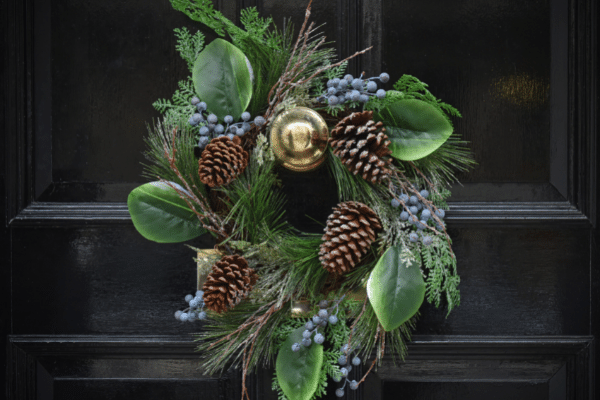
Yule, often known as Yuletide, is a Germanic celebration celebrated all over the world(mostly German and Scandinavian). The celebration has pagan origins, including links to the Norse deity Odin and the Anglo-Saxon Feast of Modraniht. Yuletide is one of the oldest and most prominent winter holidays in the world since it coincides with the Winter Solstice.
Yule was celebrated by igniting a large wood in a bonfire and spending the entire night outside. Log burning is still done today in most places, many people celebrate Yule by creating a Yule altar, creating an evergreen Yule wreath, or giving back to Mother Nature. Candlelit dinners and Yule tree decorations, as well as the exchange of nature-themed presents, are popular.
Lighting trees, distributing gifts, and hanging holly and/or mistletoe are just a few of the customs of Yule. Although Yule seems to have been completely consumed by Christmas at one point, current neo pagans and Wiccans have restored the occasion. It’s now a year-round celebration that looks to be gaining in popularity.
Festivus
Celebration Date: December 23
Category: Parody
Celebration Purpose: To raise awareness against Christmas consumerism.
Region of celebration: Worldwide, Particularly USA
Festivus is a December global festival that gained popularity in 1997 as a result of a Seinfeld episode called “The Strike.” The goal of this mock holiday is to raise awareness about Christmas consumerism. Festivus is observed by standing around a modest aluminum pole rather than purchasing an expensive Christmas tree. “Feats of Strength” and “airing of grievances” are two more prominent Festivus practices.
Some analysts have slammed Festivus supporters, describing them as anti-traditionalists with erroneous ideas about Christmas and its genuine significance. The holiday Festivus is popular, particularly amongst budget spenders and minimalists.
The made-up “festival” from the show Seinfeld gains lots of popularity and people actually start to celebrate it outside of the show and thus start this cult.
FAQs
What are the major religious festivals in December?
Hanukkah, Yule, Christmas, Kwanzaa and New Year’s Eve are some of the major festivals in December.
How many global holidays are in the month of December?
There are more than 8 global holidays celebrated throughout the world in December.
Why is Kwanzaa celebrated?
Kwanzaa is a celebration of many communities, families that began as a way for African Americans to reconnect with their African roots and traditions.
What country celebrates Yule?
Yule is the name of the old Winter Solstice festivals celebrated by Germanic peoples of Germany and Scandinavia.
Why do people celebrate Festivus?
The reason for the celebration of this mock holiday is to raise awareness about Christmas consumerism.
What is the tradition on New Year’s Eve?
Attending parties, eating special New Year’s dishes, making New Year’s goals, and viewing fireworks displays are all popular customs during New Year’s Eve.
What is the point of Boxing Day?
Boxing Day was originally a day off for slaves, as well as the day when their employers gave them a special Christmas box. On Boxing Day, the servants would also return home to offer their families Christmas boxes.
What is Hanukkah and why is it celebrated?
Hanukkah is a Jewish celebration that confirms Judaism’s beliefs and celebrates the rededication of Jerusalem’s Second Temple by burning lights on each of the festival’s eight days.
What is Christmas and why is it celebrated?
Christmas honors the birth of Jesus Christ, whom Christians believe to be God’s Son. The word ‘Christmas’ is derived from Christ’s Mass. (or Jesus). A Mass service is a moment for Christians to remember that Jesus died for us and then rose again.
Final Words
Evidently, these are the list of December global holidays to help you understand and celebrate the end of the year more fruitfully.
Celebrate these December holidays with friends, family close to your heart and stay cheerful.
Also, it’s also the ideal time to thank people who have actually made the previous year worthwhile by showering them with appropriate presents and appreciation.
Happy Holidays.

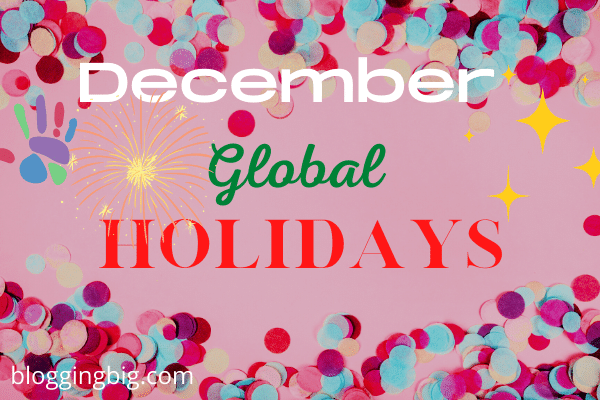
Kedar Dangal
Making a difference, Adding the sum.